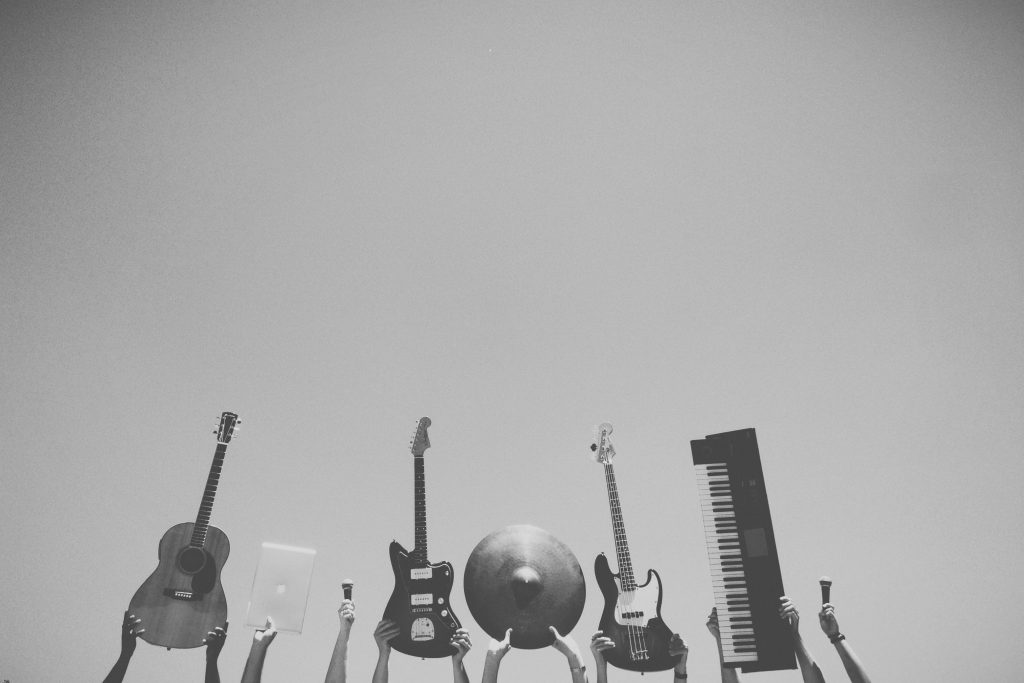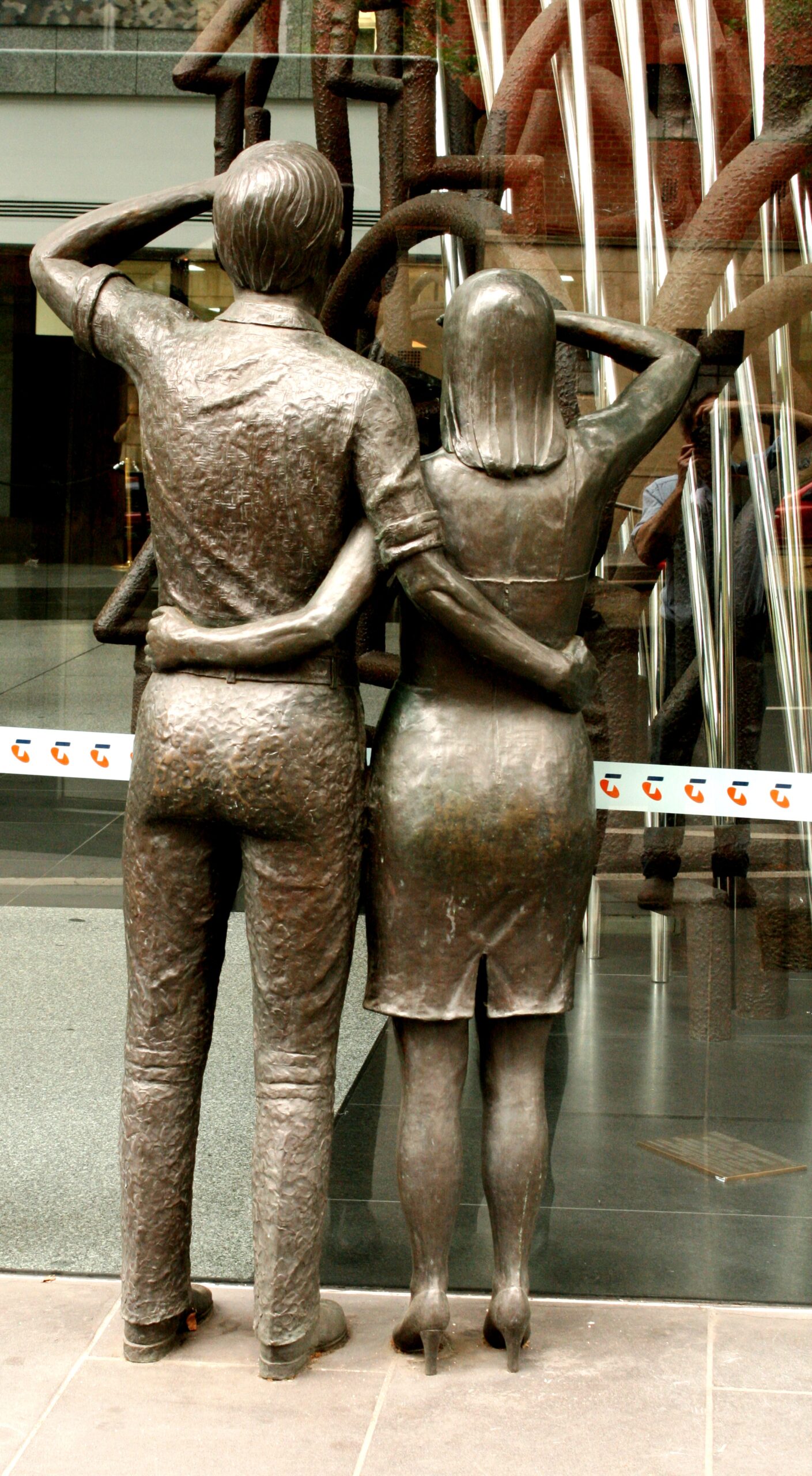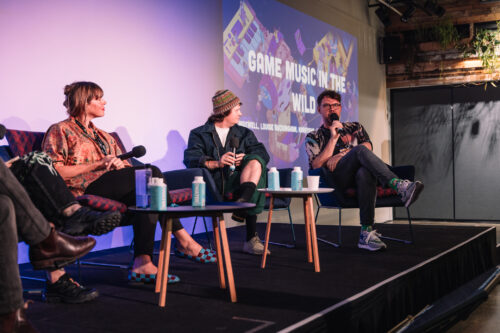Talking music copyright with APRA AMCOS

After our recent ‘Sampling, Parodies & Quotation with Arts Law’ webinar, Aditya Vasudevan, Solicitor at Arts Law, sat down with Georgia Ginnivan of APRA AMCOS. These were her key takeaways from the session:
What do Clive Palmer, Puff Daddy and Ed Sheeran have in common? Why, we’re so glad you asked!
In this article we unpack the copyright fundamentals that music creators should know. We also delve into the laws regarding getting permission to use others’ work, specifically with sampling, parodies and satire.
#1 – Write original music? You’re a copyright owner!
Let’s touch on the basics. If you make original music you are a (either partially or full) copyright owner.
Aditya explains: “Copyright is a bundle of exclusive rights that you have in your work that allows you to control how it’s used by other people, and how you use it yourself.”
Copyright automatically protects three components of music: lyrics, music and the sound recording (master). Those three components can have different copyright owners, and in the eyes of the law are treated separately.
Note – copyright protects the original forms or way an idea is expressed, not the idea or information itself.
#2 – Key rights for copyright owners
You are entitled to a bundle of exclusive rights as a copyright owner.
For copyright in a musical work or lyrics, these include:
- Right to reproduction (to create a recording eg on vinyl, CD or cassette, to print sheet music)
- Right to first publication (making it available to the public for the first time)
- Right to communicate to the public (eg digital communication – uploading to a streaming service or social media, or hold music)
- Right to public performance (eg. play in a pub)
- Right to adaptation (for lyrics this may be translating to another r and for musical works this may be arranging or transcribing).For music and lyrics, the general rule is that [MF2] copyright lasts for the life of the creator plus 70 years and for sound recordings, 70 years from first publication. Once copyright expires, the work is said to be in the ‘public domain’ – that is, anyone can use it for any purpose.
#3 – Collaborating? Get an agreement in writing.
If you’ve been in a co-write or studio production session, you’ll know that the lines between songwriter/musician/producer can get blurred. In the same way, without a written agreement, copyright ownership can also get messy.
Aditya explains: “When you’re collaborating with someone, copyright of the music and lyrics as a starting point belongs to the author. But if there are multiple people who are making significant original contributions to a work, often the default position is that you will co-own those works as collaborators.”
To avoid issues down the line, Aditya suggests sitting down with your collaborators and agree on copyright splits. “Put something down in writing that sets out how you’re going to split copyright in that work – whether it’s just the lyrics or whether it’s the music.”
Check out our article about songwriting splits.
#4 – Whose hard drive is it anyway?!
Copyright for the sound recording (master) is DIFFERENT to copyright for music and lyrics. Who owns the copyright on the master recording? The test here is different. If you pay for studio time (‘commission’ a recording) generally you as commissioner will own the copyright.
But that’s not the case if you’re recording at a friend’s studio or recording on a laptop at home (‘uncommissioned’ recordings). Generally, the owner of that recording is whoever owns the recording medium (hard drive or laptop) plus live performers.
This means that in a lot of cases, the master’s copyright can be shared with the session musicians who contributed to the sound recording in the studio. Again, it’s important to lay everything out in an agreement so that it’s clear between everyone.
Getting written agreements/contracts is an important part of professionalising your music practice.
Arts Law has a bunch of agreement templates for you to explore and to put in place for your own work.
#5 – So, you want to use another part of a song in your own?
What if you’re using someone else’s work in your song? This includes sampling the master track, as well as using music or lyrics.
First, you’ll have to check three points:
- Is it still under copyright? (Ie not yet in the ‘public domain’? See point 2).
- Are you using a ‘substantial part’ of the original track? (a recognisable, distinctive, core part of the song?)
Aditya says, “it’s not about how much you’ve taken, it’s about the quality of what you’ve taken, rather than the quantity”. This can be an ambiguous grey area. “You have to think about the level of risk that you’re willing to take on, when you’re making those decisions”.
- Does a ‘fair dealing’ defence apply? (are you using the original work in a review, for criticism, or for parody or satire?) – More on this below.
#6 – P. Diddy vs The Police
One example of a high-profile copyright case is P Diddy. His 1997 track ‘I’ll Be Missing You’ directly samples The Police’s ‘Every Breath You Take’.
- Puff Daddy: Puff Daddy [feat. Faith Evans & 112] – I’ll Be Missing You (Official Music Video) – YouTube
- The Police: The Police – Every Breath You Take (Official Video) – YouTube
Sting’s music was under copyright, and P Diddy didn’t get permission. In a 2003 article with Rolling Stone, Sting lamented ‘those guys just take your sh*t, put it on a record, and deal with the legality later’. It ended up being settled out of court, where they established a royalty package which allowed him to continue to use and distribute the song.
To avoid later problems with using someone else’s work, Aditya recommends getting a permission (a ‘music licence’) first.
“If in doubt, get a licence, get permission. That will save you from being in a worse bargaining position later. After you’ve already released a song and having the original copyright owner come to you and force you to strike a deal that’s not as good as you might have got if you’d licensed it beforehand.”
A more recent example is Ed Sheeran being taken to court for an alleged copyright infringement claim on his track ‘Thinking Out Loud’ being compared to Marvin Gaye’s ‘Let’s Get it On’. It was ruled in May this year that Ed Sheeran is not liable for copyright infringement.
Want to take the first steps towards getting a music licence? Learn more here.
#7 – How do I get permission to use copyrighted works?
To legally sample a sound recording, you’ll need to get permission to use both the recording and the music and lyrics. As discussed earlier, the copyright owners are not necessarily the same. To get permission to sample a sound recording, generally you’ll have to contact the record label or the artists themselves. PPCA (the Phonographic Performance Company of Australia Limited) might be able to assist!
Whereas permission to use music and lyrics comes from the publisher or artist themselves. APRA AMCOS might be able to help! Learn more here.
Check out this article where APRA AMCOS member Sarah Hopkins negotiated a co-writing split with Björk.
#8 – ‘Fair dealing’ defence
A ‘fair dealing’ defence is an argument in Australia whereby using copyrighted material for a specific purpose is not an infringement provided that use is ‘fair’. There are five ‘Fair Dealing’ defences, two of which are directly relevant to this topic. They are:
- Using the copyrighted works for criticism or review or,
- parody or satire
If you are critiquing or reviewing music and quote the lyrics or use the sound recording, you will need to acknowledge the author and title of the work. In the eyes of the law, that is ok if the use is ‘fair’.
Using a copyrighted sound recording, lyrics or music is also ok when used for satire or parody as long as the use is “fair”.
Aditya explains, “Parody imitates the original [musical work], takes elements of the original for the purpose of ridiculing the original song or author. Poking fun, generating humour, sometimes mocking. That’s the way the courts have looked at parody.”
Remember this Kings of Leon parody video?
Satire is generally broader in definition. ‘Satire is not necessarily an imitation, and not necessarily targeted at the original song or original author. It could use an existing song to make a broader comment on society. In doing it, it transforms the song in a way that is satirical.’ Think of YouTube comedian Randy Rainbow, for example.
What does ‘fair’ mean, in a ‘fair dealing’ defence? “What is ‘fair’ is a slippery concept”, says Aditya.
“Is the use genuinely for the purpose you say it is? Or is that an excuse? Has your use of the original work disadvantaged the copyright owner? Ie, is your use of the work driving more people away from the original, to your song?”
Enter Clive Palmer!
In his 2019 election campaign, Clive Palmer’s political ads used music with a stunning resemblance to the Twisted Sister’s 1984 track ‘We’re Not Gonna Take It’.
Palmer tried to get a licence for the work, but negotiations broke down. He pushed ahead anyway without permission, changing the title to ‘Aussies Not Gonna Cop It.”
Palmer’s legal team argued for a ‘Parody and Satire’ defence, to which the judge replied that his categorisation of the ads as ‘satirical’ was “ambitious, to say the least”.
Palmer was ordered to pay $1.5 million in damages. Twisted Sister’s singer and lyricist Dee Snider told the court: “The rendition was awful, the message was misrepresented, and Mr Palmer’s image is not good for my heavy metal image either.”
Copyright authors also have the ‘right to integrity’ – that is, not having your work meddled with in a way that could harm your reputation as an artist. In this case, Mr Snider expressed to the court that Palmer’s ‘derogatory’ treatment of Snider’s work affected his reputation. [MF3]
#9 – Arts Law is here for you!
If you have further specific legal questions, ArtsLaw is here to help.
Head here to get advice from an arts lawyer.
*This article was published with permission from APRA AMCOS. Read the original article and get to know APRA AMCOS on their website.



